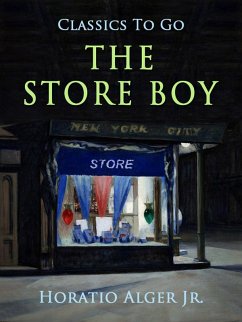
The Store Boy (Illustrated) (eBook, ePUB)

PAYBACK Punkte
0 °P sammeln!
Finally Silas Greyson agreed, and Ben promised to be on hand bright and early the next day. It may be stated here that wood was very cheap at Pentonville, so that Ben would not be overpaid. There were some few things about the house which Ben wished to do for his mother before he went to work anywhere, and he thought this a good opportunity to do them. While in the store his time had been so taken up that he was unable to attend to them. He passed a busy day, therefore, and hardly went into the street. Just at nightfall, as he was in the front yard, he was rather surprised to see Tom Davenport...
Finally Silas Greyson agreed, and Ben promised to be on hand bright and early the next day. It may be stated here that wood was very cheap at Pentonville, so that Ben would not be overpaid. There were some few things about the house which Ben wished to do for his mother before he went to work anywhere, and he thought this a good opportunity to do them. While in the store his time had been so taken up that he was unable to attend to them. He passed a busy day, therefore, and hardly went into the street. Just at nightfall, as he was in the front yard, he was rather surprised to see Tom Davenport open the gate and enter. Horatio Alger, Jr. (January 13, 1832 - July 18, 1899) was a prolific 19th-century American author, best known for his many juvenile novels about impoverished boys and their rise from humble backgrounds to lives of middle-class security and comfort through hard work, determination, courage, and honesty. His writings were characterized by the "rags-to-riches" narrative, which had a formative effect on America during the Gilded Age. Alger's name is often invoked incorrectly as though he himself rose from rags to riches, but that arc applied to his characters, not to the author. Essentially, all of Alger's novels share the same theme: a young boy struggles through hard work to escape poverty. Critics, however, are quick to point out that it is not the hard work itself that rescues the boy from his fate, but rather some extraordinary act of bravery or honesty, which brings him into contact with a wealthy elder gentleman, who takes the boy in as a ward. The boy might return a large sum of money that was lost or rescue someone from an overturned carriage, bringing the boy-and his plight-to the attention of some wealthy individual. It has been suggested that this reflects Alger's own patronizing attitude to the boys he tried to help.
Dieser Download kann aus rechtlichen Gründen nur mit Rechnungsadresse in A, B, CY, D, DK, EW, E, FIN, F, GR, IRL, I, L, M, NL, P, S, SLO, SK ausgeliefert werden.









